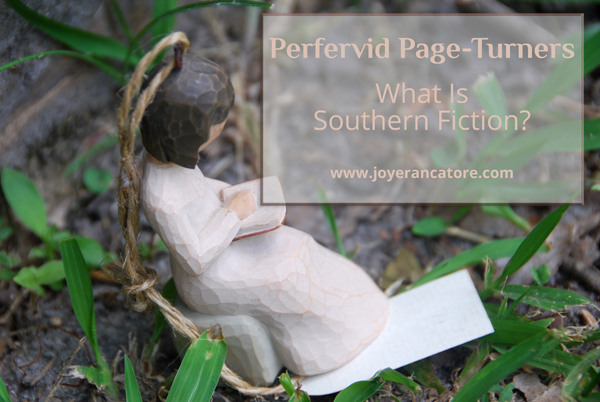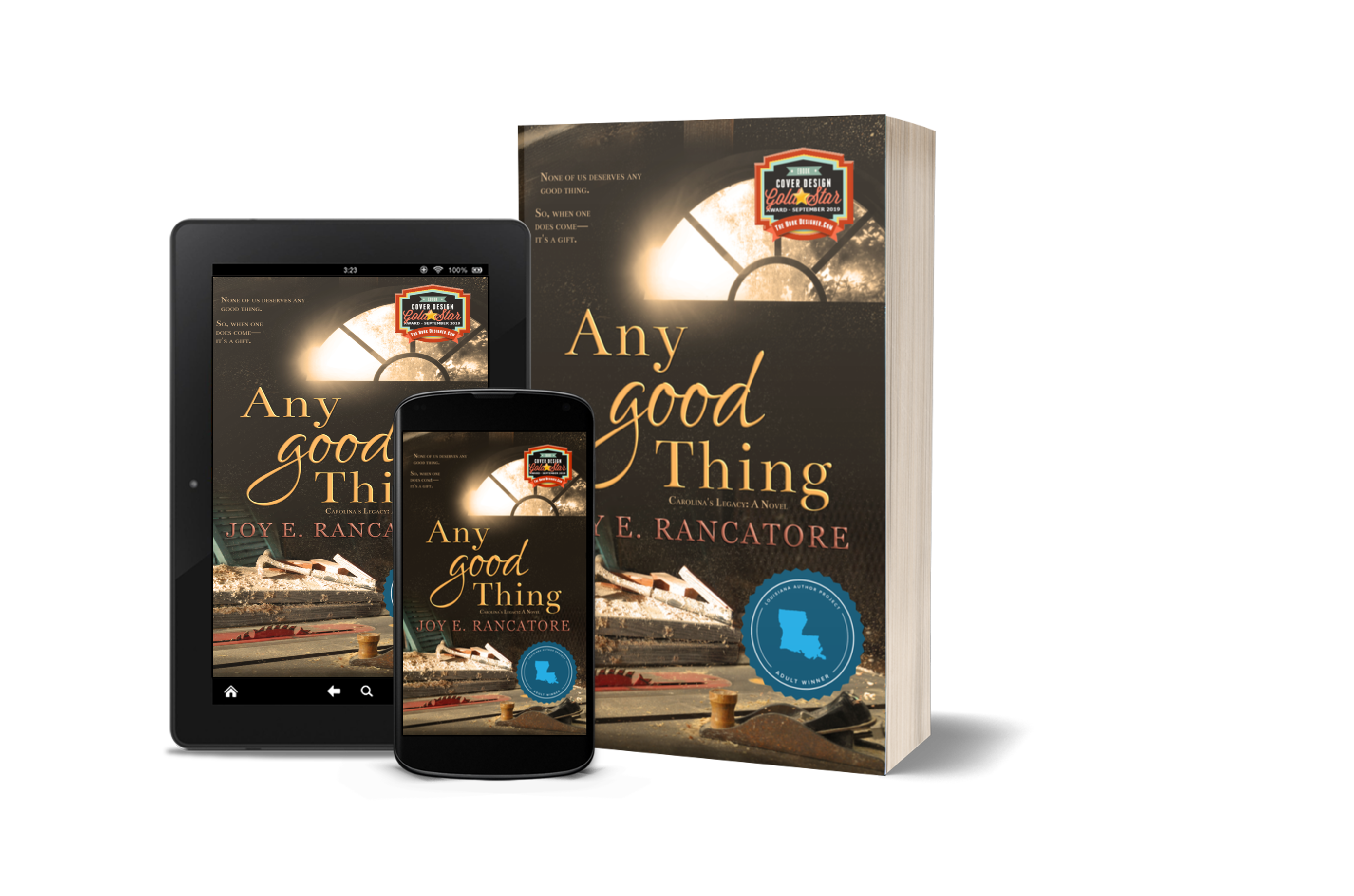Last month, I had the opportunity to attend a southern (US) fiction panel at my favorite annual event—the Mississippi Book Festival. I missed the first few minutes of that panel.
(In my defense, I was meeting Ann Patchett and handing her a copy of my novel—and might have been slightly fangirling. Don’t ask me what I said; the only thing I can tell you is, likely nothing intelligent. Also, don’t ruin my happiness; I realize she’ll never read it. It’s enough for me to know she touched it.)
From what I understand, I missed an interesting attempt at defining southern fiction. As my friends and I were discussing it afterward, I jumped to a reaction of “How can they not define it; they wrote it?” To which my friend asked, “Yeah. So, how would you define it? You wrote a southern fiction novel.”
I quickly said, “Oh, well, of course, it’s umm; well, you know, it’s really …” Or something slightly less smart. Actually, I mentioned a few aspects—religion, food; welcoming in a stranger with open arms, no questions asked. But, the question lingered. I mean, I wrote a novel set in the South and labeled it as southern fiction. I should know this, right?
Time to Research
Since then, I’ve been pondering the question with this post in mind. So, like every good writer, I thought and thought … and started researching three days ago. It all worked out fine, though, because the research didn’t take long. Turns out, there was one common answer for this question—we ain’t got a clue, honey.
From the perspective of an English major at a southern college, I can tell you that southern fiction has been often banned, frequently condemned and regularly critiqued. And, I’ve always felt like there should be much more to it than controversy, doggone it.
As I was hunting around online, I stumbled upon one article and one post that really stood out from the (not many) others I found. Leah Price wrote a thoughtful piece for the Daily Press in Virginia Beach in 2015, and her title sums it up: “There’s no one way to define Southern fiction.” I think that might just be the key to understanding the genre. What struck you about Flannery O’Connor’s “A Good Man Is Hard to Find” will not be what struck me; same with William Faulkner’s The Sound and the Fury and any other quintessential classic southern story. We’ll agree that it’s southern fiction and then we’ll each add our own “because” clauses. The same applies to more recently published southern fiction: Where the Crawdads Sing, Above the Waterfall, The Clearing, Any Good Thing.
Another aspect of the article that struck me was what Henrietta Ford, an author interviewed for the piece, had to say about the need to make a distinction for southern cultural norms. This was the same conclusion I came to that led to my use of the label “southern fiction.” I had an early reader who’s not from the south let me know that every interaction in my book was weird and unbelievable. Definitely southern then! This is why we have this genre to itself. In each of the books and stories I have mentioned, certain events or interactions or details just don’t make sense to someone who’s never encountered the unique culture and people of the southern United States.
Meredith Borders, in a 2012 LitReactor post, “What Makes a Southern Novel?” gives us much more to think about this topic with some fantastic quotes. I think my favorite line of hers, though, was, “Many of [these southern novels] illuminate the notion of home—of wanting to escape home, of returning home, of the idea that home never truly leaves us, no matter where we may ramble.” While southern stories might originate in the South, the characters often journey to other parts of the nation or world. They retain their innate “southernness” as they do, even if they sure as shootin’ try to shed it. The South seems to have something about it—maybe something in the soil—that gets in, deep under the skin, and hangs on.
Over to You
So, I’m posing this question to you, dear reader friends. What is southern fiction? Go ahead, answer in the comments below. Don’t worry; there’s no stupid answer. Did you not read the part about how no one has a definition? That includes experts in the literary field. I really am anxious to hear all your thoughts.
My Turn
For the remainder of this post, I’m putting on my reader hat. This isn’t meant to be a professional answer to the “What is southern fiction?” question. This is simply my reader’s reaction, because at the end of the day, isn’t all reading of literature simply our reaction to another’s written words? That’s what makes stories live on, longer than their authors will.
So, when I reflected on the southern fiction I’ve read, I realized I always came away not just feeling—though, my goodness, did I feel!!—but I came away seeing, tasting, hearing and smelling. To read southern fiction is to be immersed in the South and all it contains. It’s the roughness of the bumpy shells, the satisfying Ziiiip! of the opening and the silky soft coolness within that makes up the pea-shelling process. It’s the long evenings in the dying light where the nighttime lingers just a little longer beneath the horizon cause folks on the porch want to soak in just a bit more of that purty sunset. It’s to taste the glory that’s slow-cooked in a hand-made batch of dumplin’s. It’s to smell the honeysuckles on the vines and taste that worthwhile teensy drop at the end of the little filament within it. Pull it out just so, and it’s like finding a tiny drip of gold. It’s the sight of fresh-turned earth—and the glorious smell that accompanies it—and the slight rustle in the trees above as the mischievous squirrels skitter, plotting their conquest of the scrumptious goods that will soon push their way up from beneath the rows. It’s the little spray from the kernels when you sink into the first bite of sweet corn for the season.
It settles deeper than the senses and goes far beyond the many, many colloquialisms. Southern fiction encompasses the heart, soul and spirit.
Religion—love, hate or shake-your-fist-at—sits at the center of southern culture. So does family and friendship and love and standing up against all odds. It’s all part of who we are. It’s been part of us from the womb. Every bit of it is ingrained in us.
We can move away and live away for decades. It’s still stuck in the fiber of our being. Don’t believe me? Read Ann Pancake’s Strange As This Weather Has Been. One of the characters that features in the story moved away from the mountains of West Virginia many years before, but came back to visit his mother. As the opening of one of the chapters explains, “Mrs. Taylor’s boy Avery looks like city, but he talks like home.” Regardless of how long you’ve been away, go home, and the accent comes out and the respect for your elders resurfaces. You’ll find yourself grinning at field peas fresh from the garden and shaking away worms without a care while shucking corn. Your memaw will ask if you want some more cornbread to soak up those greens. You’ll smile and say, “Yes ma’am; I reckon I do.”
Later on the front porch, those sinking sunbeams linger longer. The leaves rustle a little more. A breeze blows, bringing the scent of honeysuckle past your nose. You breath deeply and fill your being with the scents and senses of the South. Nature and land, cities and towns, communities—each of these encompass what the South is as well. It’s our land and our places that are as much characters as the people themselves. We personify them when we speak. Our literature paints their details and makes them rise off the pages. They move us and thrill us and inspire us. They fill us with belonging, place … home.
With that home likely comes a Mawmaw who might seem like all she cares about is fattenin’ you up, but who feels deeper and loves harder and grieves wider than any other person in your life. It’s a home that may not always be peaceful and you may have thought you left it behind for something better, but it still claims you. It’s homecooked meals and hot days in the woods and toe dips in a freezing cold stream with an invisible source.
One thing that grows taller than the corn stalks is pride. Pride in community, in family, in congregation, in the land, in the lineage and in the history.
That history brings shame as well. It’s a history our nation shares. Pride and shame meet in a bowing of the head and a strengthening of the resolve. We remember it—won’t ever forget it—but we will move past it, arm in arm with all brothers and sisters, fighting against the prejudice that remains and intentionally choosing a better way. Family, friends, neighbors—the words string together, like peas on your fork. We are a community, drawn together by place, people, past—we are the South, and southern fiction tells our tales.





Trackbacks/Pingbacks